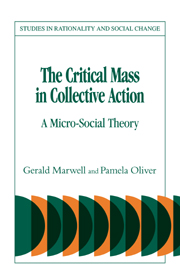Book contents
- Frontmatter
- Contents
- PREFACE
- ACKNOWLEDGMENTS
- 1 The critical mass and the problem of collective action
- 2 Building blocks: goods, groups, and processes
- 3 The paradox of group size
- 4 The dynamics of production functions
- 5 Social networks: density, centralization, and cliques
- 6 Selectivity in social networks
- 7 Reach and selectivity as strategies of recruitment
- 8 Unfinished business
- REFERENCES
- NAME INDEX
- SUBJECT INDEX
8 - Unfinished business
Published online by Cambridge University Press: 19 March 2010
- Frontmatter
- Contents
- PREFACE
- ACKNOWLEDGMENTS
- 1 The critical mass and the problem of collective action
- 2 Building blocks: goods, groups, and processes
- 3 The paradox of group size
- 4 The dynamics of production functions
- 5 Social networks: density, centralization, and cliques
- 6 Selectivity in social networks
- 7 Reach and selectivity as strategies of recruitment
- 8 Unfinished business
- REFERENCES
- NAME INDEX
- SUBJECT INDEX
Summary
It is a commonplace to observe that intensive scrutiny of a given social (or physical, for that matter) phenomenon tends to reveal its complexity and open more questions than are answered. So, of course, has it been with our examination of the problem of collective action. In hindsight, we see that each of the specific analyses in this book is relatively narrow, which is to say that each is focused on a particular kind of collective action that arises under a particular set of conditions. Thus, we certainly do not claim to have arrived at some comprehensive account of the dynamics of collective action. Instead, we have introduced or drawn attention to a list of variables, some new tools, and a general orientation toward analyzing distinct collective action problems. These beginnings obviously leave much left to be done. Alternative assumptions and questions may lead to quite different lines of inquiry and theorizing. At least, that is our hope.
In this chapter we first review briefly the analyses we have already undertaken and the answers we have found. We then call attention to some of the “unfinished business” that we think is most worth pursuing by ourselves and others. Obviously, new imaginations may find even more interesting issues to pursue and ways to pursue them. Our intention is simply to offer some places one might start.
Summary and discussion of results
The first substantive issue we addressed (in Chapter 3) was the group-size problem as posed by Olson. We argued that, contrary to Olson's claims, there is no consistent group-size effect on the prospects for collective action.
- Type
- Chapter
- Information
- The Critical Mass in Collective Action , pp. 180 - 193Publisher: Cambridge University PressPrint publication year: 1993



